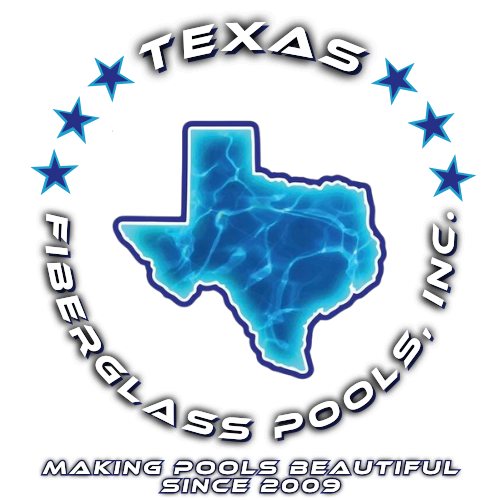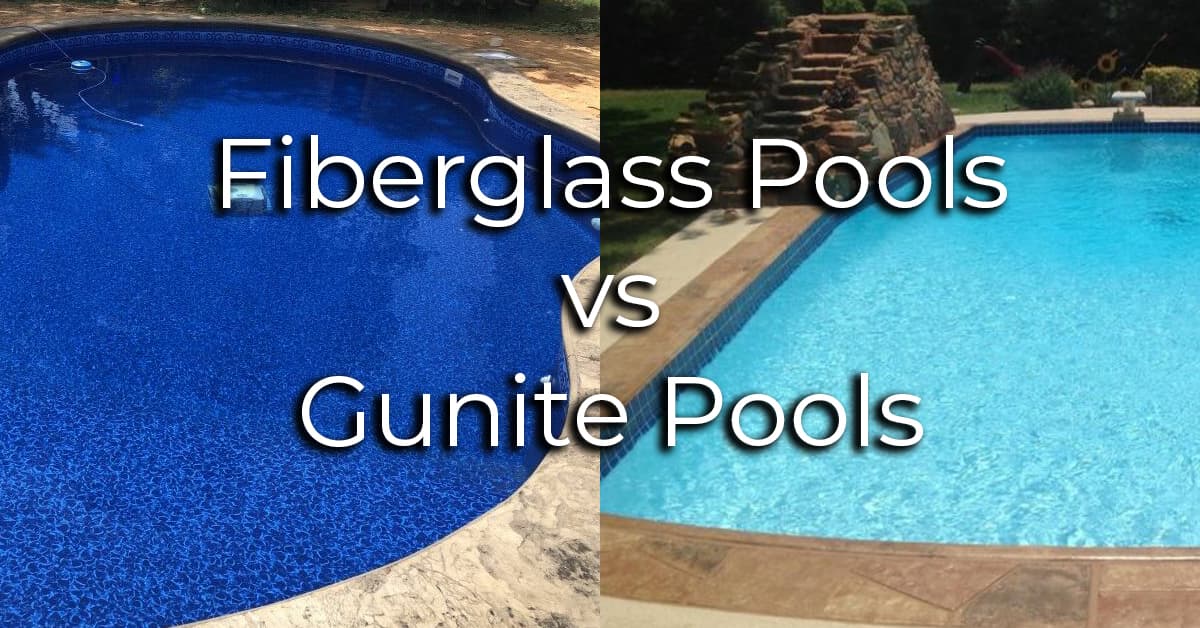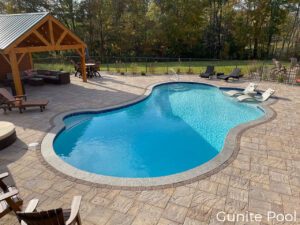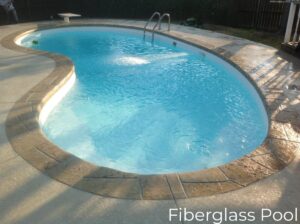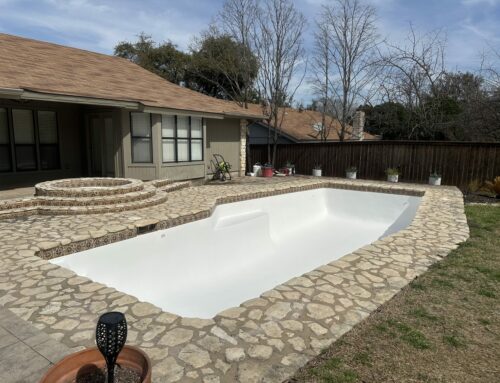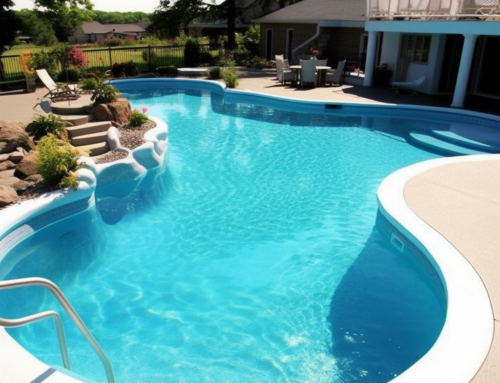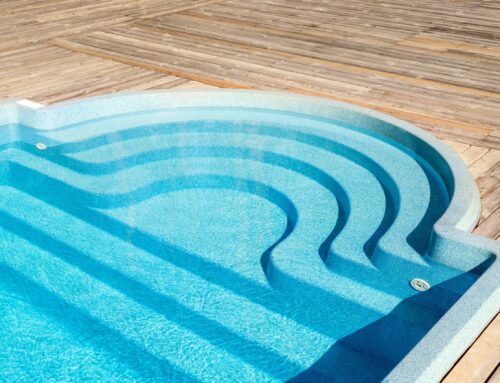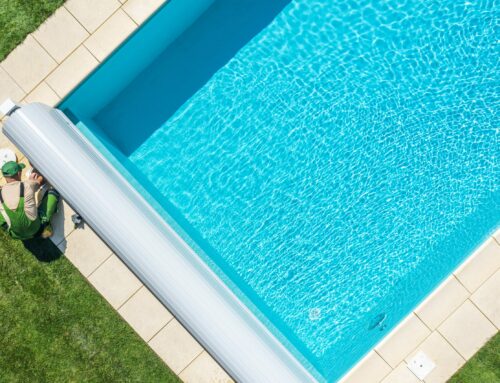If you’re in the market for a swimming pool, you may be wondering whether to choose a gunite or fiberglass pool. Both have their pros and cons, and the right choice for you will depend on your specific needs and preferences. In this blog post, we’ll take a closer look at both types of pools and help you decide which is the best option for you.
Gunite vs Fiberglass Pools
Gunite and Fiberglass are the two major types of inground pools that you can get for your yard. Before choosing which is right for your particular landscape let’s take a closer look at the pros and cons, costs, installation times, and other important factors in making your choice.
What is a gunite pool?
A gunite pool is a type of inground swimming pool that is made from a mixture of concrete and sand. Gunite is sprayed onto the walls and floor of the pool using a high-pressure hose, and then it is left to cure for several days. Once it has cured, the gunite will be very strong and durable, and it will be able to withstand a lot of wear and tear.
What is a fiberglass pool?
A fiberglass pool is a pool that is made from a standard size mold. Since fiberglass pools are usually pre-formed, they come in a limited number of shapes and sizes. Fiberglass is a very strong and durable material, and it is also quite smooth, so it requires less maintenance than other types of pools.
Fiberglass Pool Pros and Cons
Pros
Fiberglass Installation Time
One of the biggest advantages of fiberglass pools is that they can be installed very quickly. In most cases, a fiberglass pool can be installed in just a few days.
Low Maintenance
Fiberglass pools are also very easy to maintain. They are smooth and non-porous, so they resist algae growth. Fiberglass pools also require fewer chemicals than other types of pools.
Fiberglass Durability
Fiberglass is a very strong and durable material, so fiberglass pools will last for many years with proper care.
Different Sizes Available
Fiberglass pools are available in most standard shapes and sizes.
Fiberglass Pool Cost
Fiberglass pool cost depends on a few factors: shape, design, and size. The average fiberglass pool including installation costs between $20,000 and $40,000.
Fiberglass Pools Last Long
Fiberglass pools have a lifespan of 20-30 years but can last as long as 50 years provided they are built by a high-quality manufacturer and installed properly.
Cons
Fiberglass Pools Lack Flexibility
One of the biggest disadvantages of fiberglass pools is that they are only available in a limited number of shapes and sizes. If you want a pool that is custom-made to your specifications, then a fiberglass pool is not the right choice for you.
Low inventory/availability
If you have your heart set on a fiberglass pool, be aware that there may be a low inventory/availability in certain areas, which could lengthen the installation process.
Can have installation flaws
Like any inground pool, a fiberglass pool can have installation flaws. Make sure you hire a reputable installer who has experience installing fiberglass pools.
Gunite Pool Pros and Cons
Pros
Durability of Gunite Pools
Gunite is a very strong and durable material, so gunite pools will last for many years with proper care.
Gunite Pool Customization (design, features, & finishes)
Because gunite is sprayed onto the walls and floor of the pool, it can be customized to nearly any size, shape, or depth.
Cons
Gunite Pool Cost
Gunite pools are usually more expensive than fiberglass pools. Due to the fact that they are custom built and need to be built on-site, you are looking at a higher cost. Costs are typically within the $50,000 to $100,000 range.
Gunite Pool Maintenance
Gunite pools require more maintenance than fiberglass pools. They are porous, so they require more chemicals to keep the water clean.
Gunite Pool Installation Time
One of the biggest disadvantages of gunite pools is that they can take several weeks to install. Because gunite pools are custom-built on-site, they usually take longer to install than fiberglass pools.
Gunite vs Fiberglass Pool Cost
When it comes to cost, gunite pools are usually more expensive than fiberglass pools. This is because they are custom-built on-site, and they typically range in price from $50,000 to $100,000. Fiberglass pools are less expensive because they are mass-produced in factories and typically cost between $20,000 and $40,000.
Gunite vs Fiberglass Pool Maintenance
Fiberglass pools are easier to maintain than gunite pools because they are smooth and non-porous. This means that they resist algae growth and require fewer chemicals than gunite pools. Gunite pools are more difficult to maintain because they are porous, so they require more chemicals to keep the water clean.
Gunite vs Fiberglass Pool Installation
One of the biggest disadvantages of gunite pools is that they can take several weeks to install. This is because they are custom-built on-site, and the process is usually much longer than with fiberglass pools. Fiberglass pools can be installed in as little as one week because they are mass-produced in factories and shipped to the site.
Gunite vs Fiberglass Pool Lifespan
Fiberglass pools have a lifespan of 20-30 years but can last as long as 50 years if they are built by a high-quality manufacturer and installed properly. Gunite pools have a lifespan of 50 years, however, they do require resurfacing every 7-10 years and need to be maintained regularly.
Fiberglass vs Gunite Pool Designs, Shapes, & Sizes
Fiberglass pools are available in a wide variety of shapes and sizes, so you can find one that fits your needs. However, the pool designs and sizes are standard based on the manufacturer and cannot be altered.
Gunite pools can be customized to nearly any size, shape, or depth because they are sprayed onto the walls and floor of the pool. If you have a particular design in mind or want an extra deep pool then being able to customize designs and sizes is a huge bonus.
In Conclusion
Both gunite and fiberglass pools have their pros and cons, so it really depends on your needs as to which type of pool you should choose. If you want a pool that is custom-built, has a long lifespan, and can be customized to nearly any size or depth then gunite is the way to go. However, if you want a pool that is less expensive, easier to maintain, and can be installed quickly then fiberglass is the better choice. Whichever type of pool you choose, make sure to do your research and talk to a professional before making a decision.
Frequently Asked Questions
How many years does a gunite pool last?
A gunite pool typically lasts for 50 years, but it will need to be resurfaced every seven to ten years.
Can gunite pools crack?
Yes, gunite pools can crack if they are not constructed properly or if the ground underneath the pool settles. Working with a professional and experienced pool company will eliminate any worries you have about your pool cracking.
Can fiberglass pools crack?
Fiberglass pools are less likely to crack than gunite pools, but it is still possible if the ground underneath the pool settles or if the pool is not installed properly. Again, working with a professional and experienced pool company will help to ensure that your pool is installed correctly and will not crack.
Can a gunite pool be heated?
Yes, a gunite pool can be heated using a gas or electric heater. Solar heaters are also an option, but they will take longer to heat the pool.
Can fiberglass pools be heated?
Yes, fiberglass pools can be heated using a gas or electric heater. Solar heaters are also an option, but they will take longer to heat the pool.
Are gunite pools hard to maintain?
Gunite pools are more difficult to maintain than fiberglass pools because they are porous and require more chemicals to keep the water clean. Fiberglass pools are non-porous, so they resist algae growth and require fewer chemicals.
How often should you resurface a gunite pool?
A gunite pool should be resurfaced every seven to ten years.

